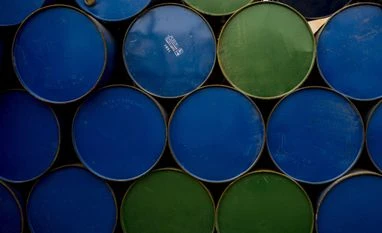Oil settles higher, trade choppy as tight supply vies with rate hike fear
European Central Bank President Christine Lagarde has cemented expectations for a ninth consecutive rise in euro zone rates in July
)
Representative Image (Photo: Bloomberg)
Listen to This Article
By Arathy Somasekhar
HOUSTON (Reuters) -Oil prices settled higher on Thursday after flip flopping during the session, supported by a bigger draw than expected in U.S. crude inventories but pressured by fears that rising interest rates could dent global economic growth.
Brent crude futures rose 31 cents, or 0.4%, to $74.34 a barrel. U.S. West Texas Intermediate (WTI) crude futures rose 30 cents, or 0.4%, to $69.86 a barrel.
On Wednesday, both benchmarks gained about 3% after the U.S. Energy Information Administration (EIA) said crude inventories dropped by 9.6 million barrels in the week ended June 23, far exceeding the 1.8-million barrel draw analysts had forecast in a Reuters poll.
"Crude traders remain torn between rising interest rates with fears of a global recession against elevated travel demand and shrinking crude supplies," said Dennis Kissler, senior vice president of trading at BOK Financial.
Also Read
Investors were concerned about rising interest rates and economic growth after Federal Reserve Chair Jerome Powell reiterated that he expects the moderate pace of interest rate decisions to continue in the coming months.
The number of Americans filing new claims for unemployment benefits fell last week by the most in 20 months, offering an upbeat picture of the labor market that could encourage the Fed to keep raising interest rates.
However, Atlanta Fed President Raphael Bostic reiterated his belief that moderating inflation should keep the central bank from raising its short-term rate target again.
European Central Bank President Christine Lagarde has cemented expectations for a ninth consecutive rise in euro zone rates in July.
Financial stability risk in the European Union remains at a "severe" level and the downturn in the housing market could become even more broad-based, she added.
Adding to pressure, annual profits at industrial firms in China, the world's second-biggest oil consumer, extended a double-digit decline in the first five months as softening demand squeezed margins.
"The lack of prospects for fuel demand growth has limited the gain in oil prices, even with supply curbs by oil producers," said Tetsu Emori, CEO of Emori Fund Management Inc.
Given falling prices, Saudi Arabia this month pledged to sharply cut its output in July, adding to a broader OPEC+ deal to limit supply into 2024.
(Additional reporting by Ahmad Ghaddar in London,Yuka Obayashi; editing by Jason Neely, David Evans, Barbara Lewis, David Gregorio and Deepa Babington)
(Only the headline and picture of this report may have been reworked by the Business Standard staff; the rest of the content is auto-generated from a syndicated feed.)
More From This Section
Don't miss the most important news and views of the day. Get them on our Telegram channel
First Published: Jun 30 2023 | 7:45 AM IST


